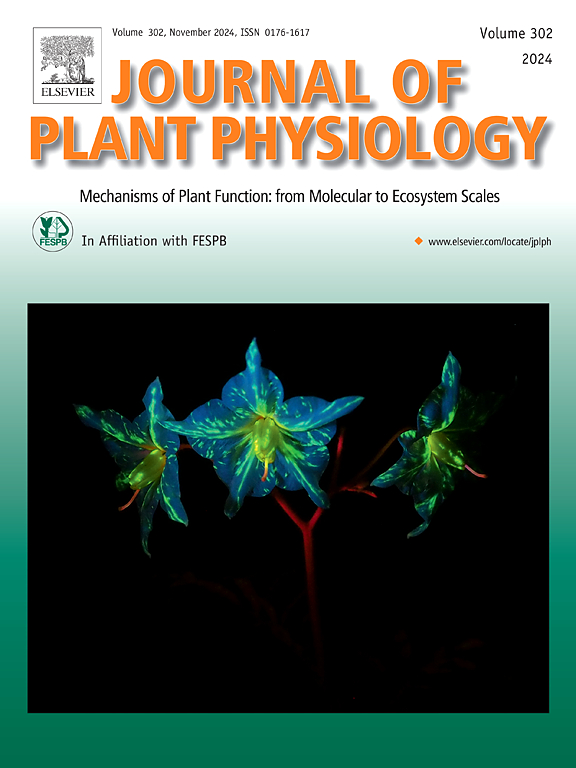The R2R3-MYB transcription factor MdMYB62 negatively regulates the drought and salt tolerance in apple
IF 4.1
3区 生物学
Q1 PLANT SCIENCES
引用次数: 0
Abstract
Drought and salt stresses represent significant environmental constraints that severely impair global plant growth and development. While numerous transcription factors regulating drought and salt stress responses have been identified across plant species, their functional mechanisms remain incompletely understood. In this study, we characterized MdMYB62, a MYB transcription factor from apple (Malus domestica), and elucidated its functional role under abiotic stress conditions. Quantitative reverse transcription PCR (qRT-PCR) analysis revealed that MdMYB62 expression was significantly modulated under both drought and salt stress conditions. Functional analyses revealed that overexpression of MdMYB62 in apple calli led to increased sensitivity to drought and salt stress.Consistent with these findings, ectopic expression of MdMYB62 in Arabidopsis resulted in reduced tolerance to these stress, which was associated with elevated accumulation of reactive oxygen species (ROS). These results collectively establish MdMYB62 as a negative regulator of plant stress responses and provide new insights into the molecular mechanisms underlying plant adaptation to abiotic stress.
R2R3-MYB转录因子MdMYB62负调控苹果的耐旱性和耐盐性
干旱和盐胁迫是严重影响全球植物生长发育的重要环境制约因素。虽然已经确定了许多调节植物干旱和盐胁迫反应的转录因子,但它们的功能机制仍然不完全清楚。本研究对来自苹果(Malus domestica)的MYB转录因子MdMYB62进行了鉴定,并阐明了其在非生物胁迫条件下的功能。定量反转录PCR (qRT-PCR)分析显示,干旱和盐胁迫条件下MdMYB62的表达均受到显著调控。功能分析表明,苹果愈伤组织中MdMYB62的过表达导致其对干旱和盐胁迫的敏感性增加。与这些发现一致,MdMYB62在拟南芥中的异位表达导致对这些胁迫的耐受性降低,这与活性氧(ROS)积累升高有关。这些结果共同确定了MdMYB62作为植物逆境反应的负调控因子,并为植物适应非生物胁迫的分子机制提供了新的见解。
本文章由计算机程序翻译,如有差异,请以英文原文为准。
求助全文
约1分钟内获得全文
求助全文
来源期刊

Journal of plant physiology
生物-植物科学
CiteScore
7.20
自引率
4.70%
发文量
196
审稿时长
32 days
期刊介绍:
The Journal of Plant Physiology is a broad-spectrum journal that welcomes high-quality submissions in all major areas of plant physiology, including plant biochemistry, functional biotechnology, computational and synthetic plant biology, growth and development, photosynthesis and respiration, transport and translocation, plant-microbe interactions, biotic and abiotic stress. Studies are welcome at all levels of integration ranging from molecules and cells to organisms and their environments and are expected to use state-of-the-art methodologies. Pure gene expression studies are not within the focus of our journal. To be considered for publication, papers must significantly contribute to the mechanistic understanding of physiological processes, and not be merely descriptive, or confirmatory of previous results. We encourage the submission of papers that explore the physiology of non-model as well as accepted model species and those that bridge basic and applied research. For instance, studies on agricultural plants that show new physiological mechanisms to improve agricultural efficiency are welcome. Studies performed under uncontrolled situations (e.g. field conditions) not providing mechanistic insight will not be considered for publication.
The Journal of Plant Physiology publishes several types of articles: Original Research Articles, Reviews, Perspectives Articles, and Short Communications. Reviews and Perspectives will be solicited by the Editors; unsolicited reviews are also welcome but only from authors with a strong track record in the field of the review. Original research papers comprise the majority of published contributions.
 求助内容:
求助内容: 应助结果提醒方式:
应助结果提醒方式:


